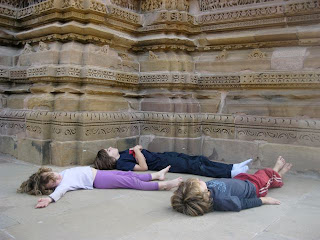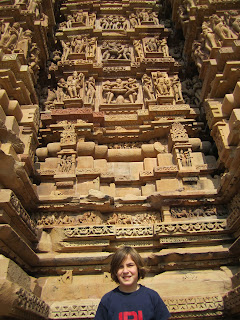The courtyard of Hotel Harmony in Khajuraho is a quiet respite from the bustling city outside its walls. It’s modest, clean, and even has a lovely little rooftop café. The people there are used to tourists who come to visit the thousand year old temples on the edge of town. These temples are known for their numerous sophisticated sculptures of daily life at the time – including erotic sculptures that look far less emblematic of daily life than of feats many of us only attempt a couple of times in our lifetime. Often with limited success.
The touts on the street are practiced hucksters, surrounding tourists sometimes five at a time, chatting them up or attempting to sell them Karma Sutra playing cards or key chains. The afternoon we arrived, Pat kept responding to the touts, “I know… all of the Karma Sutra.” The collusive chuckle that followed only gave us a moment’s break before the huckster patter resumed.
In the morning, we planned on taking a tuk-tuk to avoid the hassle. A tuk-tuk costs about fifty cents for a short ride. After breakfast, however, Spencer became nauseous. Stomach troubles are routine for westerners in India so we decided that Spencer should stay in the hotel room with Pat watching cricket on the little television in our room, while I went with Murphy and Keir’s family to see the temples. Then I could stay with Spencer in the afternoon while Pat saw the temples by himself.
I was concerned about Spencer being ill, but a part of me was relieved that I wouldn’t have to explain or deal with the erotic imagery with my ten-year-old boy. Avoidance is not the best parenting technique for dealing with awkward subjects, but it’s certainly a universal one.
We bought tickets and slipped onto the well-maintained grounds with stretches of grass that the young ones could run on. After deflecting the touts at the gates, the grounds were even more serene than they had seemed from the road. We saw several temples jutting toward the sky. People walked the pathways from temple to temple quietly in groups. When we reached the first group of temples, we removed our shoes and walked up cool steps to various sanctums, honoring Shiva, who is often called the god of destruction. Later, I heard him referred to as the god of transformation, which was easier for me to understand since Shiva does take numerous forms.
Murphy and Zoe ran up and down the steps to several temples, exclaiming, “Here’s a bull” or “A snake!” Keir, Robyn, and I took turns listening to the audio guide which gave information about several of the sculptures. About the erotic ones, the male voice told us that enjoying physical pleasure was one of the tenants of Hinduism. He also stressed that the sculptures were a celebration of procreation, which would have been very important to a race of people struggling to survive in eleventh century, India.
Again, I enjoyed the blurring between sacred, profane, and quotidian. Children bounding up the steps, flopping on thousand-year-old religious artifacts. I couldn’t imagine kids being allowed the same kind of license in a European cathedral from the same era. Murphy didn’t pause at the erotic images that the male audio voice told us showed lovers, “enjoying many pleasures and showing a sense of humor.” I wondered if this must be doubly true when one of the lovers was a horse, as was the case a few times.
After a few temples, we spread out on the lawn for a rest and Murphy pulled out his football and I watched him toss it around against the backdrop of the temples.
Keir’s cell phone rang. It was Pat. He and Spencer were on their way. Pat figured Spencer had recovered enough since he had been hopping from bed to bed in excitement over the cricket match on the television. It took them minutes to walk the stretch from the hotel. I was thrilled to see that Spencer was bouncy enough to pass the football.
Shortly, we headed off to another cluster of temples. These temples not only had the silhouette of a lingam (symbolizing the penis), but upon closer viewing, that lingam was formed by many smaller lingams. The children bounded up the steps of several temples, many different images of Shiva represented inside. I lagged, taking in the gorgeous artistry and beautiful outlines of other temples in the distance. My breathing was slow and my shoulders loose. Who were the people who actually worshiped at these temples a thousand years ago? Were they like me with similar concerns for their children and their own health and happiness? Surely they were. I felt deeply connected to them as my bare feet hit the depressions theirs had made from years and years of climbing those same steps to worship and to ask for strength and deliverance.
The others had gone on to another temple. I followed stopping at the bottom of another set of steps, the children bounding down toward me.
“Is it cool?” I asked Spencer.
“Ahh. The architecture is, but the rest isn’t that interesting,” Spencer replied.
“Huh? Really?” I said. He’d been enjoying the imagery in the other temples, especially animal incarnations of the gods.
“Yeah,” he said, not concealing his disdain. “It’s a temple totally dedicated to a penis.”
A heck of a lot more work than just buying a Ferrari, I thought as I ascended the steps. The lingam is one of the representations of Shiva. As I entered the inner chamber I saw the lingam shrine – thick round, really more like a wide candle.
When I descended the steps, Keir said, “A little lingam heavy.”
“Yup,” I replied. “Which begs the question, ‘Where are the yonis?’”
Keir and Robyn assured me that there were temples elsewhere in India that gave yonis some attention. Which was reassuring, even surprising, given that yonis throughout medieval Europe at the same time were definitely being given short shrift. When we stopped to sit in the shade of a temple I caught Pat up on some of the audio tour we had taken earlier. “Procreation?” Pat said. “I saw quite a few scenes that had nothing to do with procreation.”
That evening, we took in our third pizzeria in two days. We sat on the rooftop, a string of lights illuminating our faces. While we waited for the food the kids walked over to the edge to watch two dogs playing on an adjacent rooftop. Below us the city bustled. In the states the boys don’t get this many pizzas and finger-chips. So when the waiter came up the stairs to deliver our food Spencer tore himself away from the dogs, skipped over and took his seat. As his pizza appeared in front of him, Spencer crowed, “Margarita pizza, finger chips, and mango juice – that’s how we roll in India!”


















